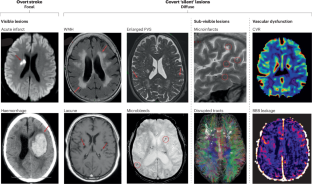Endothelial cells as key players in cerebral small vessel disease
IF 26.7
1区 医学
Q1 NEUROSCIENCES
引用次数: 0
Abstract
Cerebral small vessel disease (SVD) is a vascular disorder that increases the risk of stroke and dementia and is diagnosed through brain MRI. Current primary prevention and secondary treatment of SVD are focused on lifestyle interventions and vascular risk factor control, including blood pressure reduction. However, these interventions have limited effects, a proportion of individuals with sporadic SVD do not have hypertension, and SVD shows strong familial and genetic underpinnings. Here, we describe the increasing evidence that cerebral endothelial cell dysfunction is a key mechanism of SVD. Dysfunctional endothelial cells can cause cerebral blood vessel dysfunction, alter blood–brain barrier integrity and interfere with cell–cell interactions in the neuro-glial-vascular unit, thereby causing damage to adjacent brain tissue. Endothelial cells in SVD may become dysfunctional through intrinsic mechanisms via genetic vulnerability to SVD and/or via extrinsic factors such as hypertension, smoking and diabetes. Drugs that act on endothelial pathways are already looking promising in clinical trials, and understanding their action on endothelial cells and the surrounding brain may lead to the development of other therapies to limit disease progression and improve outcomes for individuals with SVD. Cerebral small vessel disease is a common cause of dementia and stroke. In this Perspective, Wardlaw and co-workers describe evidence from human brain imaging and preclinical models that points to dysfunction in the endothelial cells that line the walls of cerebral blood vessels as a key driver of small vessel disease.


内皮细胞在脑血管疾病中的重要作用
脑血管病(SVD)是一种血管性疾病,可增加中风和痴呆的风险,通过脑MRI诊断。目前SVD的一级预防和二级治疗主要集中在生活方式干预和血管危险因素控制,包括降低血压。然而,这些干预措施的效果有限,一部分散发性SVD患者没有高血压,并且SVD具有很强的家族和遗传基础。在这里,我们描述了越来越多的证据表明,脑内皮细胞功能障碍是SVD的一个关键机制。功能失调的内皮细胞可引起脑血管功能障碍,改变血脑屏障的完整性,干扰神经-胶质-血管单元中细胞间的相互作用,从而对邻近脑组织造成损伤。SVD中的内皮细胞可能通过SVD的遗传易感性和/或外部因素(如高血压、吸烟和糖尿病)的内在机制发生功能障碍。作用于内皮细胞通路的药物在临床试验中已经看起来很有希望,了解它们对内皮细胞和周围大脑的作用可能会导致其他治疗方法的发展,以限制疾病进展并改善SVD患者的预后。
本文章由计算机程序翻译,如有差异,请以英文原文为准。
求助全文
约1分钟内获得全文
求助全文
来源期刊

Nature Reviews Neuroscience
NEUROSCIENCES-
自引率
0.60%
发文量
104
期刊介绍:
Nature Reviews Neuroscience is a multidisciplinary journal that covers various fields within neuroscience, aiming to offer a comprehensive understanding of the structure and function of the central nervous system. Advances in molecular, developmental, and cognitive neuroscience, facilitated by powerful experimental techniques and theoretical approaches, have made enduring neurobiological questions more accessible. Nature Reviews Neuroscience serves as a reliable and accessible resource, addressing the breadth and depth of modern neuroscience. It acts as an authoritative and engaging reference for scientists interested in all aspects of neuroscience.
 求助内容:
求助内容: 应助结果提醒方式:
应助结果提醒方式:


